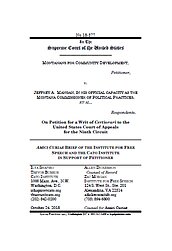Learn more about Cato’s Amicus Briefs Program.
Under the First Amendment, governments are supposed to play a minimal role in the regulation of campaigns and elections. As the Supreme Court said in McCutcheon v. Federal Election Commission, “those who govern should be the last people to help decide who should govern.” But the Court has also allowed governments to impose registration, reporting, and donor disclosure requirements on candidates and civil-society groups that use funds to advocate for a candidate or an issue. In 1976, in the seminal case of Buckley v. Valeo, the Supreme Court limited such regulations to groups that are headed by a candidate or that have it as their “major purpose” to facilitate the nomination or election of a political candidate. Generally, the “major-purpose test” has looked to whether a group spends more than 50 percent of its expenditures on speech that either expressly advocates an outcome in an election for public office or is the functional equivalent of such speech.
The circuit courts, however, have increasingly refused to apply the major-purpose test. Indeed, the First, Second, Seventh, and Ninth Circuits have concluded that the major-purpose test is not a constitutional requirement, and the Supreme Court failed to intervene. As a result, several states have subjected groups to regulation as PACs based on arbitrary, often low-value contribution thresholds. In some states, the threshold is one dollar.
Montana, for example, imposes regulations on groups that spend as little as $251 on political speech. Montanans for Community Development (MCD) is a 501(c)(4) organized to promote policies that create jobs and grow the Montana economy. It wants to engage in political speech—in particular, electioneering communications that promote energy jobs and mention local candidates’ positions on such policies—without being subject to Montana’s entity-based PAC burdens.
MCD filed suit in federal district arguing that the regulations are an impermissible burden on the group’s First Amendment activities. The district court ruled for the state, and the Ninth Circuit affirmed the district court. Cato and the Institute for Free Speech have filed an amicus brief supporting MCD’s request for Supreme Court review. We argue that the Supreme Court should reaffirm the importance of the major-purpose test in its First Amendment jurisprudence. We also urge the Court to demand that states use objective, workable standards in their campaign finance regulations to prevent the appearance of corruption and partisanship.
Many States appoint commissioners to preserve the appearance of non-partisanship or bipartisanship like the Federal Election Commission. But in some states, like Montana, decisions about what organizations are considered PACs are left to a single, political appointee. The absence of a bright-line rule like the major-purpose test in these jurisdictions creates opportunities for viewpoint suppression and partisan gamesmanship. Political groups in Montana are thus subject to the whims of an official who may not share their views, and, if the Ninth Circuit’s decision stands, are unprotected by the First Amendment.
Permitting states to continue using vague and arbitrary standards raises serious concerns about fairness, concerns that that would be alleviated if Montana actually followed the major-purpose test. The Supreme Court should take the case to reaffirm that burdensome regulations on political speech cannot be applied arbitrarily and without sufficient justification.
